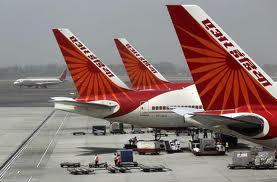
New Delhi, May 9: The crisis at Air India continues on Wednesday with no end to the stalemate between the management and the pilots. However, reports say that Air India's pilots may strike a deal with the government and return to work. This comes after the cash-strapped national career sacked 10 agitating pilots, derecognised their union, the Indian Pilots Guild, and sealed its offices as around 160 pilots failed to join duty.
Air India issued a statement on Tuesday night. It says, "The pilots chose to deliberately damage the image and reputation of the company by disrupting flights by proceeding on mass sick leave. This most extreme and irresponsible agitation aimed at disrupting flight schedules and inflicting inconvenience on our esteemed passengers. As a consequence, Air India has derecognized the Indian Pilots Guild and sealed its offices. It has also terminated the services of and dismissed ten office bearers of the Guild."
The pilots met the Chief Labour Commissioner on Tuesday to find a way out but talks were inconclusive.
The pilots' move had forced the airline to cancel more than five international flights since Monday night. Confusion prevailed at the Delhi Airport on Tuesday with many passengers waiting to fly out. It was the same story in Mumbai.
One flight was delayed and two international flights were cancelled on Wednesday morning.
The latest pilots' strike came right after the ailing airlines has been given a Rs 30,000 crore bailout package. Under fire, the now derecognised Indian Pilots Guild has appealed to the Aviation Minister to intervene. Speaking to IBN18 Editor-in-Chief Rajdeep Sardesai, the Indian Pilots Guild President, Jitendra Awhad, said, "No management is going to say that the strike is legal. They are going to do everything possible to put pressure. They are spreading rumours that the pilots are returning, they are scared, they are reporting fit, nothing of this sort will happen. The more you pinch them, the more they will unite."
"But looking at the passengers and looking at the behaviour of the management, I am folding my hands and requesting Mr Ajit Singh to intervene. A man with a socialist background cannot just undemocratically look at the management's decision of derecognising and victimisation," he added.





Comments
Add new comment